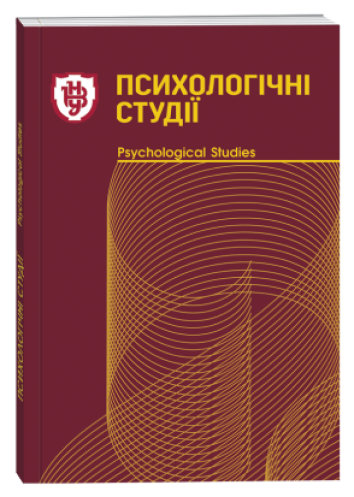PECULIARITIES OF SENSE-LIFE ORIENTATIONS OF A PERSON WITH CERTAIN LITERARY PREFERENCES
DOI:
https://doi.org/10.32782/psych.studies/2024.1.13Keywords:
meaningful life orientations, literary preferences, literary works, value orientations, goals, orientationAbstract
The article conceptualises the issues of studying the concept of meaningful life orientations and literary preferences of a personality. The content of scientific concepts that reveal the problem of the structural components of meaningful life orientations, namely, value orientations, goals, orientation and certain needs of the individual, is generalised. It is shown that literary preferences of a personality are a stable general attitude of a person to fiction in terms of realisation of a certain meaning, a set of specific socio-cultural values that correspond to the level of needs, goals and taste of a particular reader. Correlations between socialising, cultural and cognitive, aesthetic, emotional and empathic, existential, optimising, entertaining and escapist literary preferences and such values as conformism, security, power, kindness, independence and stimulation, as well between as goal orientation and locus of control-life, focus on self, communication and work have been established. It has been shown that individuals with socialising literary preferences are oriented towards such a value as conformism and are aimed at communication. It has been found that there is a correlation between cultural and cognitive literary preferences and the value of security, and that individuals with aesthetic literary preferences are stimulationoriented and focused on communication and activity. It has been found that individuals with emotional and empathic literary preferences value power and are oriented towards it in life, as well as are directed towards themselves and their own activities. It has been found that there is a correlation between existential literary preferences and locus of control-life and orientation towards communication, and these preferences correlate with escapist and optimistic literary preferences. It has been shown that individuals with entertaining literary preferences are not oriented towards conformity at all, but stimulation is important for them, while individuals with escapist literary preferences are not goal-oriented and have a reduced value of kindness.
References
Бринза І. В. Цінності та сенсожиттєві орієнтації особистості, яка переживає благополуччя. Наука і освіта: наук.-практ. журнал. № 11. Спецвип.: "Актуальні проблеми рекреаційної психології дитинства". 2011. С. 21–25.
Воронюк І. В. Дослідження латентних особистісних конструктів уподобань до літератури й інформації у старшокласників як цільових об’єктів при креативному виборі способу впливу вчителем. Науковий часопис Національного педагогічного університету імені М. П. Драгоманова. Серія 12: 171.Психологічні науки. Випуск 6(51). С. 166–172.
Воюшіна М.П. Формування системи читацьких умінь в процесі аналізу художнього твору. Початкова школа, 2004. №3. С. 39–44.
Новальська Т. Український читач у бібліотекознавчих дослідженнях (кінець XIX – початок XXI ст.) : моногр. Київ: б. в., 2005. 250 с.
Сафонік Л. Сенс життя та смисли буття: проблема розмежування. Практична філософія. Пара– Психологія смисложиттєвого розвитку особистості 475 пан. № 4(54). Київ: Інститут філософії ім. Г. С. Сковороди НАН України, 2014. С. 132–139
Сивокінь Г. М. Художня література і читач: з досвіду конкретно-соціологічних спостережень. Академія наук Української РСР, Інститут літератури ім. Т. Г. Шевченка. Київ: Наукова думка, 1971. 148 с.
Ясперс К. Психологія світоглядів / пер. з нім. О Кислюк, Р. Осадчук. Київ: Юніверс, 2009. 464 с.
Bаbiakova S., Kasacova B. Reading Preferences of Younger Learners in a Slovak-Czech-Polish Comparison In The New Educational. Review 61, (3). 2020. Р. 38–50.







